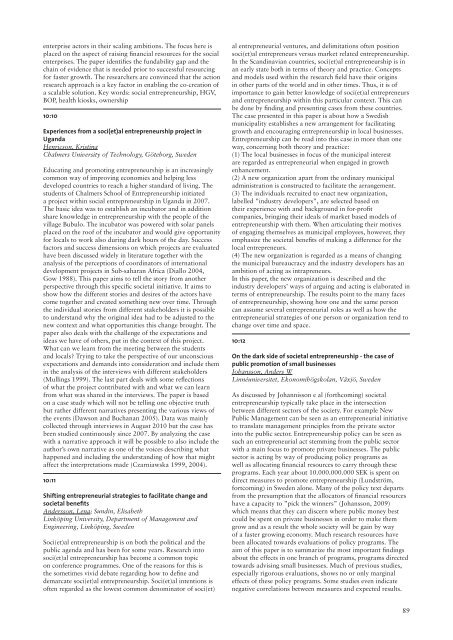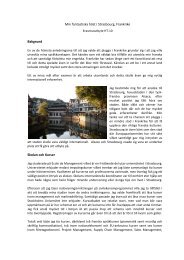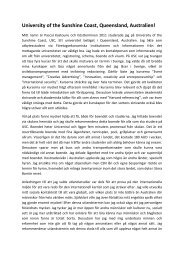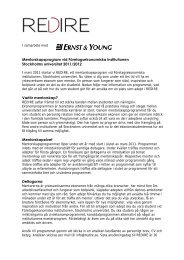Download full programme and abstract book pdf 1.6
Download full programme and abstract book pdf 1.6
Download full programme and abstract book pdf 1.6
Create successful ePaper yourself
Turn your PDF publications into a flip-book with our unique Google optimized e-Paper software.
enterprise actors in their scaling ambitions. The focus here is<br />
placed on the aspect of raising financial resources for the social<br />
enterprises. The paper identifies the fundability gap <strong>and</strong> the<br />
chain of evidence that is needed prior to successful resourcing<br />
for faster growth. The researchers are convinced that the action<br />
research approach is a key factor in enabling the co-creation of<br />
a scalable solution. Key words: social entrepreneurship, HGV,<br />
BOP, health kiosks, ownership<br />
10:10<br />
Experiences from a soci(et)al entrepreneurship project in<br />
Ug<strong>and</strong>a<br />
Henricson, Kristina<br />
Chalmers University of Technology, Göteborg, Sweden<br />
Educating <strong>and</strong> promoting entrepreneurship is an increasingly<br />
common way of improving economies <strong>and</strong> helping less<br />
developed countries to reach a higher st<strong>and</strong>ard of living. The<br />
students of Chalmers School of Entrepreneurship initiated<br />
a project within social entrepreneurship in Ug<strong>and</strong>a in 2007.<br />
The basic idea was to establish an incubator <strong>and</strong> in addition<br />
share knowledge in entrepreneurship with the people of the<br />
village Bubulo. The incubator was powered with solar panels<br />
placed on the roof of the incubator <strong>and</strong> would give opportunity<br />
for locals to work also during dark hours of the day. Success<br />
factors <strong>and</strong> success dimensions on which projects are evaluated<br />
have been discussed widely in literature together with the<br />
analysis of the perceptions of coordinators of international<br />
development projects in Sub-saharan Africa (Diallo 2004,<br />
Gow 1988). This paper aims to tell the story from another<br />
perspective through this specific societal initiative. It aims to<br />
show how the different stories <strong>and</strong> desires of the actors have<br />
come together <strong>and</strong> created something new over time. Through<br />
the individual stories from different stakeholders it is possible<br />
to underst<strong>and</strong> why the original idea had to be adjusted to the<br />
new context <strong>and</strong> what opportunities this change brought. The<br />
paper also deals with the challenge of the expectations <strong>and</strong><br />
ideas we have of others, put in the context of this project.<br />
What can we learn from the meeting between the students<br />
<strong>and</strong> locals? Trying to take the perspective of our unconscious<br />
expectations <strong>and</strong> dem<strong>and</strong>s into consideration <strong>and</strong> include them<br />
in the analysis of the interviews with different stakeholders<br />
(Mullings 1999). The last part deals with some reflections<br />
of what the project contributed with <strong>and</strong> what we can learn<br />
from what was shared in the interviews. The paper is based<br />
on a case study which will not be telling one objective truth<br />
but rather different narratives presenting the various views of<br />
the events (Dawson <strong>and</strong> Buchanan 2005). Data was mainly<br />
collected through interviews in August 2010 but the case has<br />
been studied continuously since 2007. By analyzing the case<br />
with a narrative approach it will be possible to also include the<br />
author’s own narrative as one of the voices describing what<br />
happened <strong>and</strong> including the underst<strong>and</strong>ing of how that might<br />
affect the interpretations made (Czarniawska 1999, 2004).<br />
10:11<br />
Shifting entrepreneurial strategies to facilitate change <strong>and</strong><br />
societal benefits<br />
Andersson, Lena; Sundin, Elisabeth<br />
Linköping University, Department of Management <strong>and</strong><br />
Engineering, Linköping, Sweden<br />
Soci(et)al entrepreneurship is on both the political <strong>and</strong> the<br />
public agenda <strong>and</strong> has been for some years. Research into<br />
soci(et)al entrepreneurship has become a common topic<br />
on conference <strong>programme</strong>s. One of the reasons for this is<br />
the sometimes vivid debate regarding how to define <strong>and</strong><br />
demarcate soci(et)al entrepreneurship. Soci(et)al intentions is<br />
often regarded as the lowest common denominator of soci(et)<br />
al entrepreneurial ventures, <strong>and</strong> delimitations often position<br />
soci(et)al entrepreneurs versus market related entrepreneurship.<br />
In the Sc<strong>and</strong>inavian countries, soci(et)al entrepreneurship is in<br />
an early state both in terms of theory <strong>and</strong> practice. Concepts<br />
<strong>and</strong> models used within the research field have their origins<br />
in other parts of the world <strong>and</strong> in other times. Thus, it is of<br />
importance to gain better knowledge of soci(et)al entrepreneurs<br />
<strong>and</strong> entrepreneurship within this particular context. This can<br />
be done by finding <strong>and</strong> presenting cases from these countries.<br />
The case presented in this paper is about how a Swedish<br />
municipality establishes a new arrangement for facilitating<br />
growth <strong>and</strong> encouraging entrepreneurship in local businesses.<br />
Entrepreneurship can be read into this case in more than one<br />
way, concerning both theory <strong>and</strong> practice:<br />
(1) The local businesses in focus of the municipal interest<br />
are regarded as entrepreneurial when engaged in growth<br />
enhancement.<br />
(2) A new organization apart from the ordinary municipal<br />
administration is constructed to facilitate the arrangement.<br />
(3) The individuals recruited to enact new organization,<br />
labelled ”industry developers”, are selected based on<br />
their experience with <strong>and</strong> background in for-profit<br />
companies, bringing their ideals of market based models of<br />
entrepreneurship with them. When articulating their motives<br />
of engaging themselves as municipal employees, however, they<br />
emphasize the societal benefits of making a difference for the<br />
local entrepreneurs.<br />
(4) The new organization is regarded as a means of changing<br />
the municipal bureaucracy <strong>and</strong> the industry developers has an<br />
ambition of acting as intrapreneurs.<br />
In this paper, the new organization is described <strong>and</strong> the<br />
industry developers’ ways of arguing <strong>and</strong> acting is elaborated in<br />
terms of entrepreneurship. The results point to the many faces<br />
of entrepreneurship, showing how one <strong>and</strong> the same person<br />
can assume several entrepreneurial roles as well as how the<br />
entrepreneurial strategies of one person or organization tend to<br />
change over time <strong>and</strong> space.<br />
10:12<br />
On the dark side of societal entrepreneurship - the case of<br />
public promotion of small businesses<br />
Johansson, Anders W<br />
Linnéuniversitet, Ekonomihögskolan, Växjö, Sweden<br />
As discussed by Johannisson e al (forthcoming) societal<br />
entrepreneurship typically take place in the intersection<br />
between different sectors of the society. For example New<br />
Public Management can be seen as an entrepreneurial initiative<br />
to translate management principles from the private sector<br />
into the public sector. Entrepreneurship policy can be seen as<br />
such an entrepreneurial act stemming from the public sector<br />
with a main focus to promote private businesses. The public<br />
sector is acting by way of producing policy programs as<br />
well as allocating financial resources to carry through these<br />
programs. Each year about 10.000.000.000 SEK is spent on<br />
direct measures to promote entrepreneurship (Lundström,<br />
fortcoming) in Sweden alone. Many of the policy text departs<br />
from the presumption that the allocators of financial resources<br />
have a capacity to ”pick the winners” (Johansson, 2009)<br />
which means that they can discern where public money best<br />
could be spent on private businesses in order to make them<br />
grow <strong>and</strong> as a result the whole society will be gain by way<br />
of a faster growing economy. Much research resources have<br />
been allocated towards evaluations of policy programs. The<br />
aim of this paper is to summarize the most important findings<br />
about the effects in one branch of programs, programs directed<br />
towards advising small businesses. Much of previous studies,<br />
especially rigorous evaluations, shows no or only marginal<br />
effects of these policy programs. Some studies even indicate<br />
negative correlations between measures <strong>and</strong> expected results.<br />
89

















